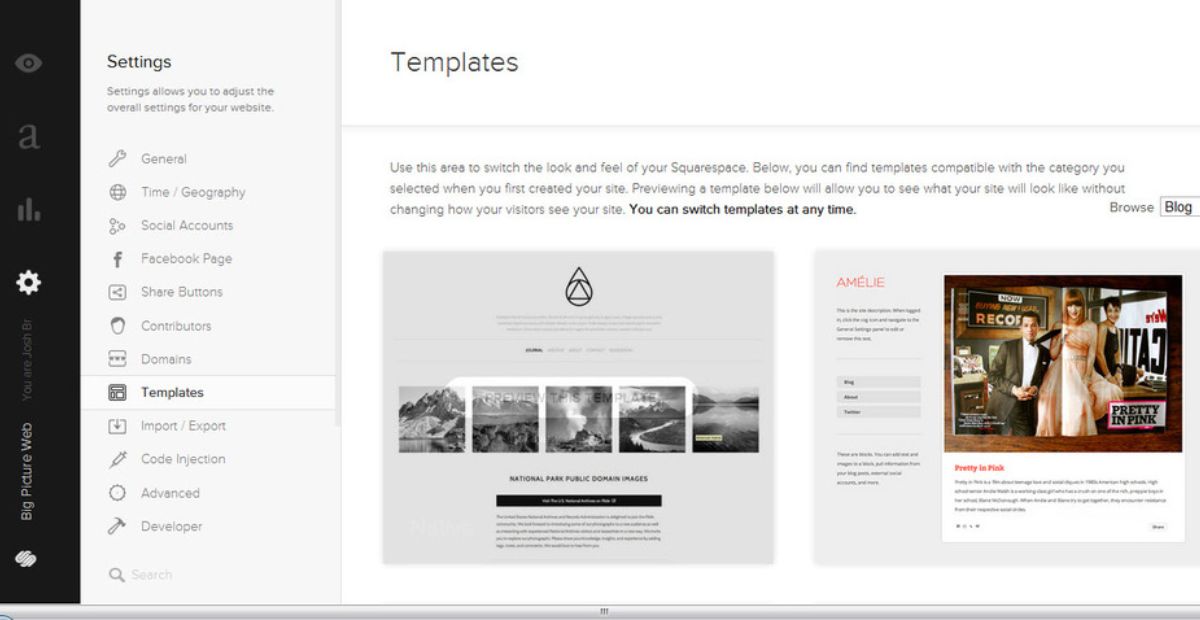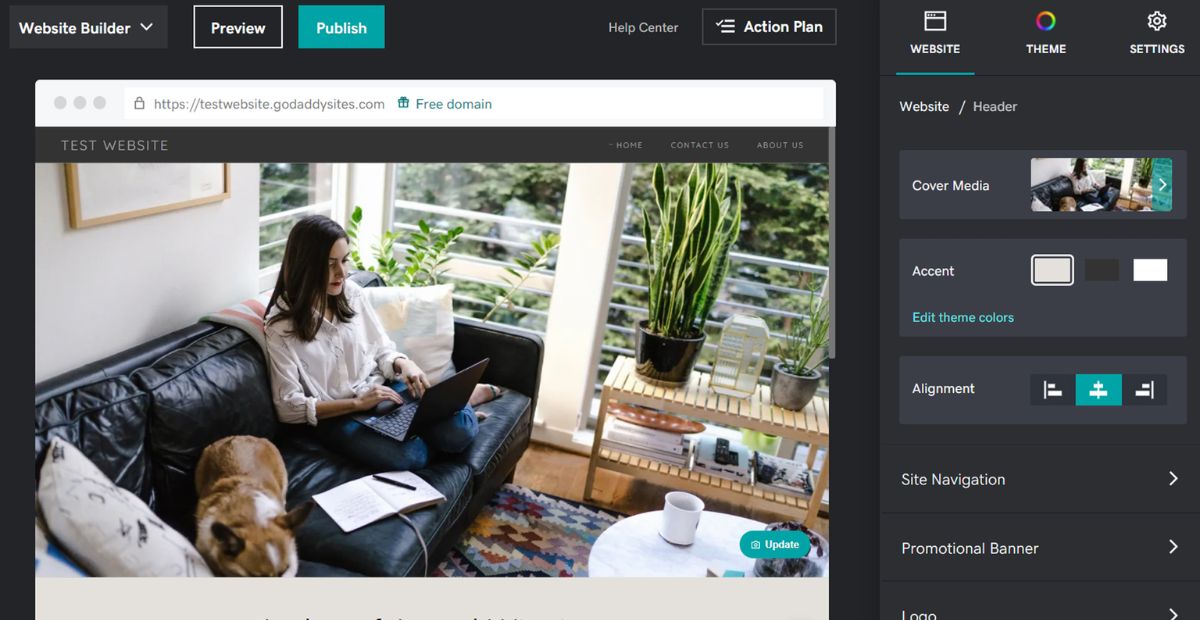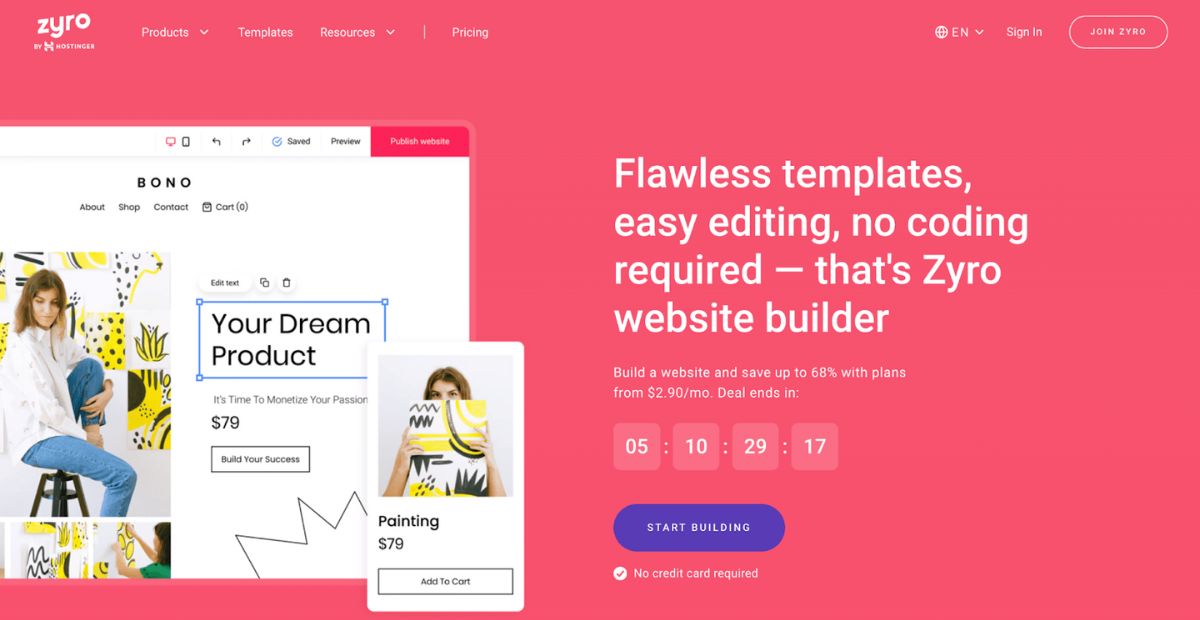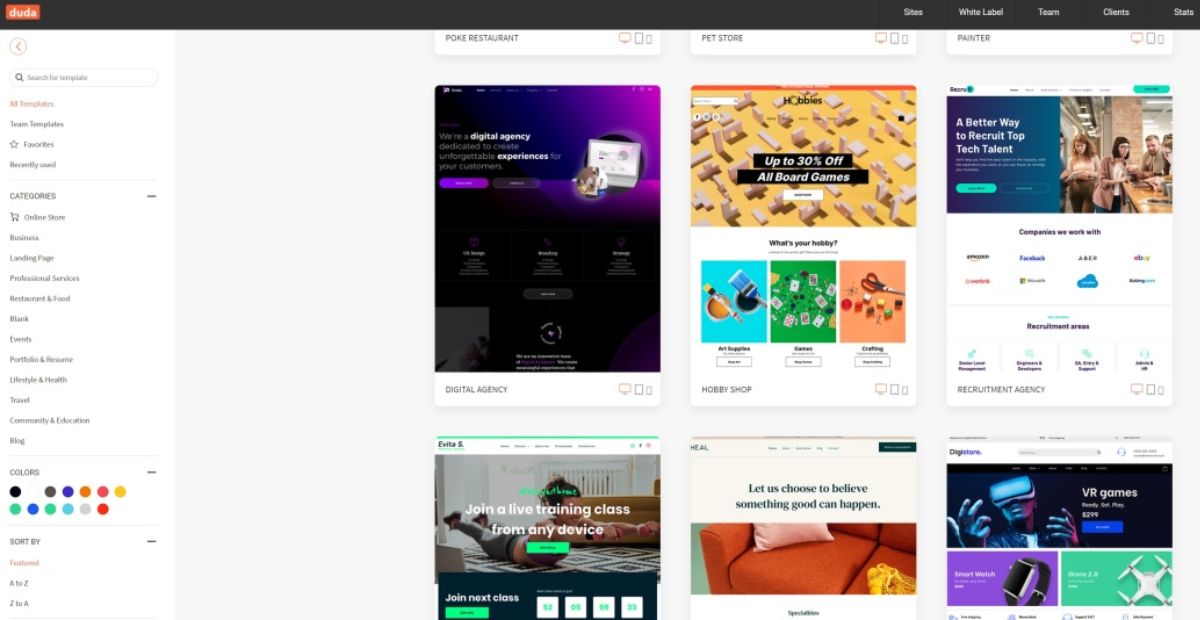In today’s digital age, having a strong online presence is crucial for the success of any small business. With countless website builders available, it can be daunting to choose the perfect one for your unique needs.
Fret not! We’ve compiled a list of the top 11 best website builder for small business in 2023, analyzing their features and benefits to help make your decision easier.
Whether you’re looking for customization options, e-commerce capabilities, or SEO tools – we’ve got you covered.
Key Takeaways
- WordPress is a highly customizable website builder with a large community of users and developers, making it an excellent choice for small businesses willing to invest time and effort into learning the platform.
- Wix offers user-friendly drag-and-drop tools that make website building easy but may come with some limitations, such as limited storage and bandwidth capabilities on free plans.
- Shopify is the best e-commerce platform for small businesses with over one million active users, providing advanced features like inventory management and secure payment processing. However, transaction fees apply unless using Shopify Payments.
- Squarespace is perfect for visually stunning websites in industries such as photography or writing; its third-party integrations are limited compared to competitors like WordPress or Wix.
- Overall, each website builder on our list has pros and cons related to customization options, ease of use, pricing models, and customer support – all important factors to consider when choosing the right one for your small business in 2023.
Table of Contents
Top 11 Website Builders For Small Businesses
Explore our comprehensive review of the top 11 best website builders for small businesses in 2023, including the pros and cons of each builder such as WordPress, Wix, Squarespace, Weebly, Shopify, BigCommerce, GoDaddy Website Builder, Jimdo, Zyro, Strikingly, and Duda.
1. WordPress

As one of the most widely-used website builders, WordPress is an excellent choice for small businesses in 2023.
Known for its immense flexibility and customization options, this open-source platform boasts a large community of users and developers that continuously contribute to its improvement.
While WordPress offers complete control over website design and functionality, it also comes with some challenges. For beginners, there may be a steep learning curve as they navigate the technical aspects needed for advanced customization.
However, numerous online resources are available to help guide them along the way.
Additionally, small businesses should factor in cost implications such as hosting services or purchasing premium themes/plugins when considering WordPress as their chosen website builder.
2. Wix
Wix stands out as one of the best overall small business website builders in 2023, thanks to its user-friendly interface and a vast selection of over 500 professionally designed templates.
This platform caters to both beginners and experts, with an intuitive drag-and-drop editor that allows for easy customization.
Despite its many advantages, there are some drawbacks to consider when choosing Wix for your small business website. For instance, the free plan comes with limited storage and bandwidth capabilities and does not offer domain personalization.
Additionally, only one user can edit the site at a time – which could be problematic if you have multiple team members working on your website simultaneously.
3. Squarespace

Squarespace is a popular choice among small businesses, especially those in the marketing and advertising, design, non-profit organization management, photography, and writing and editing industries.
Known for its aesthetically pleasing templates that are easy to customize without any coding knowledge required, Squarespace helps businesses create modern websites that leave a lasting impression on their audience.
However, Squarespace comes with some drawbacks too. For instance, there are no free plans available and access to custom code requires subscribing to a business plan which costs $16 per month if paid annually.
The platform’s third-party integrations are limited compared to competitors like WordPress or Wix. Moreover, advanced customization options can be challenging for beginners who lack technical expertise.
Squarespace also lacks multi-language support out of the box and has fewer add-ons than similar tools like Shopify or BigCommerce – something worth considering when comparing website builders for your small business needs in 2023.
4. Weebly
Weebly is a popular website builder designed for small businesses. With an overall rating of 4.0, it offers great pricing for e-commerce, starting at $29 per month, and providing advanced site statistics reporting.
One of the standout features of Weebly is its customer support options, including phone support and live chat exclusively for US customers.
This level of assistance can be very beneficial for small business owners who may need more help navigating the platform or troubleshooting any issues that arise.
Additionally, businesses can accept payments through Square and other providers using the shopping cart feature offered by Weebly.
5 Shopify

Shopify is the website builder for small businesses that want to sell products online. With over 1 million active users, Shopify offers a user-friendly e-commerce platform with powerful features such as inventory management, secure payment processing, and responsive customer support.
Shopify’s cons include transaction fees on all sales unless you use Shopify Payments and limited advanced customization options compared to other website builders like WordPress or Squarespace.
6. BigCommerce
BigCommerce is a website builder that caters to online businesses, providing customizable templates and integrated payment processing.
One of its standout features is the absence of transaction fees when using third-party payment gateways. It also supports selling in multiple currencies and integration with various marketplace platforms, making it an excellent choice for e-commerce businesses.
BigCommerce offers strong security features and 24/7 support, with a G2 rating of 4.2/5, ensuring peace of mind for business owners.
With industries like retail apparel & fashion, marketing and advertising, health & wellness, fitness, and consumer goods all benefiting from the platform’s comprehensive features; it’s not surprising why small businesses are often impressed by what they offer.
Overall if you’re looking for an intuitive e-commerce platform without hidden costs like merchant fees or charged transactions under certain circumstances (like Shopify), BigCommerce could be precisely what your budding business needs to kick-start into growth mode!
7. GoDaddy Website Builder

GoDaddy Website Builder is a well-known website builder for small businesses. It offers an easy-to-use platform with good customer support, making it an excellent choice for those who want to set up their site quickly.
With GoDaddy’s affordable pricing plans, users can take advantage of its many features and integrations with other GoDaddy services.
However, the platform has limited design flexibility and features compared to other options on the market.
If you’re looking to get started quickly and prioritize speed over design flexibility, then GoDaddy Website Builder might be your perfect solution. Its range of basic templates makes it ideal for getting a site up and running without much hassle or technical expertise involved.
8. Jimdo
Jimdo is a user-friendly website builder that offers cost-effective solutions for small businesses. With a variety of templates and easy customization, Jimdo simplifies the website-building process for novices and experts alike.
Its drag-and-drop editor allows users to design their perfect website without any technical expertise needed. Jimdo’s pros include ease of use, mobile-responsive design, SEO optimization tools, and social media integration.
However, its limited design options and lack of automatic backup might deter some users.
9. Zyro

Zyro is a user-friendly website builder that small businesses can take advantage of in 2023. With AI-powered tools, professional templates, and custom domain connections, Zyro offers an efficient solution for creating a website.
One of the benefits of using Zyro is its cost-effective pricing plans that suit different business needs and budgets.
For instance, its basic plan costs only $2.90 per month – making it more affordable than many other website builders listed in this article.
While there are some cons to using Zyro as a website builder (such as limited design options and no free plans), the benefits often outweigh them for many small businesses.
The use of AI tools also makes website building much more efficient than traditional methods – saving time and hassle along the way.
10. Strikingly
Strikingly is a top contender among the 11 best website builders for small businesses in 2023. This platform offers an easy-to-use and simple website builder with a focus on one-page websites.
It may not have as many features as some of its competitors, but it still has all the necessary tools to create a professional-looking site quickly.
Strikingly provides a free plan if users start with a strikingly.com domain, while paid plans start at $8 per month, which is competitive compared to other website builders.
These plans come with an SSL certificate and up to two limited sites.
11. Duda

Duda is a web design platform that caters to web professionals, agencies, and businesses of all sizes. It offers robust collaboration and client management features, making it an excellent choice for businesses looking to streamline their projects.
With Duda, you can create websites optimized for different devices while ensuring they meet Google PageSpeed optimization standards. The exceptional customer support provided by Duda comes at no additional commission fee.
Starting at just $29, Duda offers one of the most affordable website builder options on the market today.
Features And Benefits Of Each Website Builder
● Ease Of Use
One of the most critical factors to consider when choosing a website builder for your small business is the ease of use. You want a platform that offers intuitive, easy-to-use tools that allow you to create and edit your website with minimal hassle.
One such platform is Wix, which features an extremely user-friendly drag-and-drop interface that simplifies building websites for novices and experts alike.
HubSpot also provides a free content management system and drag-and-drop builder designed explicitly for small businesses to create professional and engaging websites without the need for any coding knowledge or tech skills.
Similarly, Framer helps small businesses effortlessly launch landing pages within days with a small team without requiring extensive experience in web development or design.
● Customization Options
Each website builder on our list offers customization options, but some are more robust than others. Squarespace is an excellent option for those looking for top-notch customization capabilities.
It offers a wide range of templates and design options, including custom CSS editing for advanced users to make their website stand out from the crowd.
Shopify is another great choice for e-commerce businesses that want extensive customization features without sacrificing ease of use.
BigCommerce also boasts customizable templates and website design tools, allowing small business owners to create visually stunning websites tailored to their brand identity.
Additionally, Duda offers outstanding collaboration and client management features that help teams manage projects efficiently while keeping clients engaged throughout the development process.
● E-commerce Capabilities
When it comes to e-commerce capabilities, Shopify takes the crown as the best website builder for small businesses. With over 900 customizable templates and a streamlined checkout process, Shopify makes it easy to set up and manage your online store.
Plus, with features like abandoned cart recovery and shipping discounts, you can increase sales while minimizing costs. However, it’s worth noting that there is a transaction fee on all sales unless you use Shopify Payments.
If you’re looking for an alternative option with e-commerce capabilities but want to avoid transaction fees, BigCommerce is another great option.
● SEO Tools
Each website builder on our list comes with varying levels of SEO tools to help your small business rank higher in search engine results.
Weebly and Wix offer the best SEO tools compared to the other website builders mentioned in the list, making them ideal for businesses looking to drive traffic organically.
Squarespace has limited customization options but offers robust e-commerce capabilities which can boost your online sales.
Shopify’s app store provides a wide range of third-party integrations that can enhance your website’s functionality while also improving its visibility in search engines.
WordPress.com is an excellent option for businesses that prioritize content marketing as it offers advanced optimization plugins and supports integrated blogging features built into its platform, helping you streamline site structure and improve internal link building, ultimately leading to better search rankings.
● Mobile-friendly Designs
A mobile-friendly website is a must-have feature for any small business in 2023. With the rise of mobile devices, more and more people are using their smartphones to browse the internet.
In fact, recent studies show that over half of all website traffic comes from mobile devices.
Most website builders offer templates with responsive designs out-of-the-box, but it’s important to check and ensure that they are truly optimized for mobile view.
For example, Wix offers “Mobile Editor” which allows you to easily customize your site’s appearance on smaller screens while Squarespace provides built-in previews so you can see how your site will look on various devices before publishing it.
Additionally, Shopify has an app marketplace where you can find third-party tools specifically designed to improve the mobile experience of your e-commerce store.
● Pricing Options
The pricing options for website builders typically vary depending on the features and benefits they offer. Some platforms offer free plans with basic features, while others require monthly or annual subscriptions to access more advanced tools.
For example, Wix’s basic plan is free but offers limited storage and bandwidth, while their premium plans range from $14 to $49 per month.
It’s important for small business owners to carefully consider their budget when choosing a website builder, as well as the specific features they need for their website.
While some platforms may seem more expensive upfront, they may provide greater long-term value based on customizations and capabilities that can enhance customer engagement and overall success.
● Customer Support
Customer support is a critical factor to consider when choosing a website builder for your small business. It’s essential to select a platform that offers reliable and accessible customer service, especially if you are not tech-savvy.
Wix, for instance, is an excellent option in this regard as it provides 24/7 support through various channels like phone, email, and chatbot services.
HubSpot also offers exceptional customer support with experts available via phone or email at all times.
They even provide educational resources and training materials on how to use their free content management system effectively to help users get the most out of their platform.
Squarespace is another popular choice among small businesses thanks to its comprehensive knowledge base and a community forum where users can ask questions or seek advice from fellow users.
Factors To Consider When Choosing A Website Builder For Your Small Business
● Business Needs And Goals
Understanding your business needs and goals is crucial when choosing a website builder. Consider what you want to achieve with your website, whether it’s selling products online or showcasing your services to potential clients.
It’s important to select a website builder that offers features tailored to meet your specific needs, such as e-commerce capabilities or SEO tools.
For example, if you’re looking for an all-in-one platform with excellent e-commerce functionality, Shopify may be the best choice for you.
Meanwhile, if you prioritize design customization options over anything else, Squarespace might be the perfect fit.
● Design Preferences
One of the most important factors to consider when choosing a website builder for your small business is your design preferences.
Do you want something sleek and modern, or do you prefer a more traditional look? Are you looking for a template that matches the colors and branding of your business, or are you willing to start from scratch with a blank canvas?
Some website builders like Squarespace and Wix offer drag-and-drop editors that allow for maximum customization, while others like Shopify have pre-designed themes that can be easily adjusted to match your brand.
● Technical Expertise
Small business owners should consider their technical expertise when choosing a website builder.
Some builders are more user-friendly and require less coding knowledge, while others offer more customization options but may need some technical know-how to navigate.
For example, WordPress is an excellent option for those with web development experience who want complete control over their website’s design and functionality.
It’s also worth considering whether you have access to someone with technical expertise who can help you if needed.
While many website builders offer customer support, having someone on your team who knows how to troubleshoot issues or make updates can save time and money in the long run.
● Budget
Small business owners need to consider their budget when selecting a website builder. The price range varies widely, from free options like WordPress and Weebly to paid plans that cost hundreds of dollars per year.
For those on a tight budget, Weebly is the best option as it offers great pricing for e-commerce and has an excellent app store, free stock images, and an option to create member-only pages.
Hostinger is another good choice for budget-conscious businesses as they offer affordable hosting plans starting at just $0.99/month.
● Time Constraints
Small business owners often have a lot on their plate, and time is of the essence. When it comes to building a website for your small business, it’s important to keep this in mind.
One advantage of using a website builder is that it can save you time compared to building a site from scratch or hiring someone else to build one for you. However, not all website builders are created equal in terms of how much time they require.
It’s important that small businesses consider their time constraints when choosing a website builder.
A platform that requires too much setup and maintenance could end up taking away valuable hours from other areas of your business operations.
On the other hand, some platforms offer quicker solutions with pre-designed templates and easy-to-use features that can help you get online faster without sacrificing quality or customization options.
How To Evaluate And Decide Which is The Best Website Builders For Small Businesses
● Define Your Business Needs And Goals
To choose the right website builder for your small business, it’s essential to define your unique needs and goals. This will help you narrow down your choices and find a platform that aligns with what you’re looking for.
For example, if you’re an e-commerce business, you’ll want a website builder that has robust e-commerce capabilities like Shopify or BigCommerce.
Other factors to consider include technical expertise, design preferences, budget constraints, and time limitations. Some platforms offer more flexibility in design but require more technical skills.
In short, defining your small businesses’ specific requirements is crucial when selecting the right website builder from the numerous options available out there in 2023.
● Research And Compare Website Builders
It’s important to thoroughly research and compare website builders before settling on one for your small business. Start by identifying your specific needs and goals, such as e-commerce capabilities or design customization options.
Look at the features and benefits of each website builder, including ease of use, mobile-friendly designs, and pricing options.
For example, Wix is known for its user-friendly interface and expansive design options, while WordPress.com offers complete control over functionality and design but requires some technical knowledge to set up.
Squarespace is ideal for businesses with portfolios or e-commerce needs but has limited third-party integrations. Pixpa caters specifically to creatives with modern templates but comes at a cost.
● Test Out Website Builders
Once you’ve narrowed down your options for website builders, it’s time to test them out. Most website builders offer a free trial or a basic version with limited features, which allows you to get a feel for the platform and see if it meets your needs.
During the testing phase, make sure you try out all of the key features that matter to your business, such as e-commerce capabilities, mobile-friendly designs, and SEO tools.
It’s also important to gather feedback from others during this process. Ask friends or colleagues to take a look at your site and provide honest feedback on its design and functionality.
Take note of any pain points they experience while navigating the site or making purchases.
● Determine The Best Fit For Your Budget
Considering your budget is an essential factor when choosing the perfect website builder for your small business.
Some platforms offer free versions with basic features that might suffice if you’re just starting and have limited funds, while others require a more significant investment.
For instance, Shopify may be more expensive than other builders, but it offers advanced e-commerce functionality that could help grow your online business substantially.
However, this doesn’t mean that you can’t find a suitable website builder within your budget range. Weebly offers affordable pricing plans for businesses on tight budgets without compromising on features and quality design templates.
Hostinger also provides excellent value for money with its low-cost options while still offering robust hosting performance and customization options.
● Check For Reliable Customer Support
One crucial factor to consider when choosing a website builder for your small business is reliable customer support.
You want to make sure that if you encounter any issues or have questions, there’s someone knowledgeable and helpful available to assist you.
Many website builders offer various levels of customer support, including email and chat support, phone support, and even 24/7 live chat.
For example, Squarespace is known for its excellent customer service with dedicated help centers and in-depth video tutorials. GoDaddy Website Builder also offers great technical assistance by providing one-on-one consultations free of charge.
Recommendations For Small Businesses: Which Website Builder Is Right For You?
● Best For E-commerce: Shopify
Shopify is an e-commerce website builder that offers a broad range of features and options for small businesses.
It has been specifically designed to allow users to create online stores with ease, and it’s widely regarded as the best website builder for e-commerce purposes.
One significant advantage of using Shopify is its user-friendly interface, which simplifies the process of setting up an online store.
Additionally, there are over 100 payment gateways available on Shopify, making transactions hassle-free.
● Best For Customization: Squarespace
Squarespace is one of the website builders that stands out when it comes to customization options.
It offers modern templates and a drag-and-drop interface, making it easy for small business owners to create their unique brand aesthetic without needing extensive technical expertise.
Squarespace’s platform is designed to be aesthetically pleasing and straightforward, with easy-to-use navigation tools and an intuitive design editor that allows users to customize nearly everything on their website.
However, Squarespace’s flexibility does come at a cost: there are no free plans available beyond its 14-day trial period, and some advanced design modifications may require custom code or more robust features offered only in higher-level subscription plans.
Additionally, users may find limitations on third-party integrations compared to other platforms.
● Best For Beginners: Wix
Wix is the perfect website builder for small business owners who are just starting out. It offers an easy-to-use drag-and-drop editor that simplifies website building, making it a great option for novices and experts alike.
One of the best features of Wix is its customer support system. They offer 24/7 support via phone or email, as well as a vast knowledge base where users can find answers to frequently asked questions.
Moreover, Wix provides an extensive range of tutorials that teach beginners how to build websites from scratch using their platform.
● Best For SEO: WordPress
WordPress is widely recognized as one of the best website builders for small businesses due to its SEO optimization capabilities.
It offers a variety of customizable templates and plugins that help improve website ranking, making it an excellent choice for businesses looking to increase their online visibility.
With WordPress, users can easily integrate social media platforms and other relevant tools to further enhance their SEO efforts.
Overall, WordPress remains an exceptional option for small business owners looking to maximize their web presence through robust search engine optimization strategies.
Its ability to offer extensive analytical insights on site statistics makes it easier for businesses to monitor their progress and make adjustments in real-time based on performance metrics such as traffic volume or click-through rates.
● Best For Budget: Weebly
If you’re looking for a website builder that won’t break the bank, Weebly is definitely worth checking out. With its user-friendly drag-and-drop editor and pre-designed templates, creating a professional-looking website has never been easier.
The best part? Weebly’s free plan offers unlimited pages, storage, and SSL security – perfect for small businesses just getting started online.
But don’t let the low price fool you – Weebly also offers premium plans with additional features like e-commerce capabilities and advanced site statistics.
And with an overall rating of 4.3 out of 5 on G2, it’s clear that many users have had positive experiences using this platform.
Conclusion: The Importance Of Choosing The Best Website Builders For Small Businesses In 2023
Choosing the right website builder for your small business can make all the difference in today’s digital age.
With so many options available, it’s important to consider your business needs and goals, design preferences, technical expertise, budget, and time constraints when deciding which one is right for you.
Whether you’re looking for e-commerce capabilities or mobile-friendly designs, there is a website builder out there that can meet your unique requirements.
By doing your research and testing out different builders before committing to one, you can ensure that your online presence will be professional-looking and effective at attracting customers.
Related Post:







